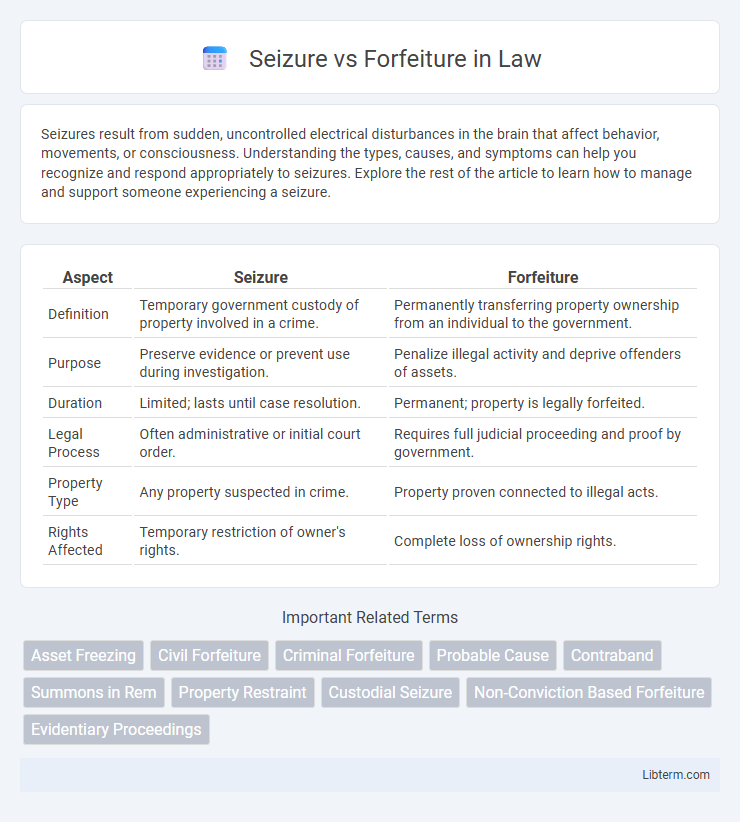Seizures result from sudden, uncontrolled electrical disturbances in the brain that affect behavior, movements, or consciousness. Understanding the types, causes, and symptoms can help you recognize and respond appropriately to seizures. Explore the rest of the article to learn how to manage and support someone experiencing a seizure.
Table of Comparison
| Aspect | Seizure | Forfeiture |
|---|---|---|
| Definition | Temporary government custody of property involved in a crime. | Permanently transferring property ownership from an individual to the government. |
| Purpose | Preserve evidence or prevent use during investigation. | Penalize illegal activity and deprive offenders of assets. |
| Duration | Limited; lasts until case resolution. | Permanent; property is legally forfeited. |
| Legal Process | Often administrative or initial court order. | Requires full judicial proceeding and proof by government. |
| Property Type | Any property suspected in crime. | Property proven connected to illegal acts. |
| Rights Affected | Temporary restriction of owner's rights. | Complete loss of ownership rights. |
Understanding Seizure: Definition and Legal Basis
Seizure refers to the act of law enforcement taking possession of property believed to be connected to criminal activity, typically under legal authority such as a warrant or court order. It is a preliminary step aimed at preserving evidence or preventing further illegal use, grounded in statutes like the Fourth Amendment in the U.S., which protects against unreasonable searches and seizures. The legal basis for seizure mandates probable cause and procedural safeguards to ensure the protection of individual rights during the investigation process.
What is Forfeiture? Key Concepts Explained
Forfeiture is the legal process where property or assets are permanently taken by the government due to involvement in criminal activity or failure to comply with certain laws. Key concepts include civil and criminal forfeiture, the standard of proof required, and the distinction between forfeiture and seizure, where seizure is temporary and forfeiture is permanent. Forfeiture often targets assets linked to drug trafficking, money laundering, or fraud, aiming to disrupt criminal enterprises by depriving them of resources.
Seizure vs Forfeiture: Core Differences
Seizure refers to the temporary taking of property by authorities for investigation purposes, whereas forfeiture involves the permanent loss of property due to legal violations, typically related to criminal activity. The core difference lies in duration and ownership rights: seizure is provisional and may be reversed, while forfeiture results in the government permanently claiming the asset. Understanding these distinctions is crucial in legal contexts involving asset recovery and property rights enforcement.
Legal Procedures: Seizure vs Forfeiture
Seizure refers to the temporary taking of property by law enforcement based on probable cause, pending investigation or legal proceedings, while forfeiture is the permanent loss of property following a legal judgment or settlement. Legal procedures for seizure typically involve obtaining a warrant or meeting exigent circumstances, whereas forfeiture requires due process, including notice to the owner and an opportunity to contest the forfeiture in court. Understanding the distinction between seizure and forfeiture is critical for ensuring proper legal rights and compliance during asset recovery operations.
Government Agencies Involved in Seizure and Forfeiture
Government agencies involved in seizure and forfeiture include the Department of Justice (DOJ), the Drug Enforcement Administration (DEA), and the Federal Bureau of Investigation (FBI), each playing critical roles in asset identification and legal proceedings. Customs and Border Protection (CBP) and Immigration and Customs Enforcement (ICE) often initiate seizures related to cross-border crimes and smuggling, while the Treasury Department's Financial Crimes Enforcement Network (FinCEN) targets illicit financial activities. Coordination among agencies like the Internal Revenue Service (IRS) Criminal Investigation Division ensures comprehensive enforcement in both civil and criminal forfeiture cases.
Property Types Subject to Seizure and Forfeiture
Property types subject to seizure and forfeiture include real estate, vehicles, cash, and personal belongings linked to criminal activity or law violations. Seizure involves temporarily taking possession of these assets during investigations, while forfeiture is the permanent transfer of ownership to the government after legal proceedings. Common assets targeted include drug proceeds, contraband, and equipment used in illegal enterprises.
Rights of Individuals During Seizure
During seizure, individuals retain the right to be informed about the reason for the seizure and to challenge its legality through due process. The Fourth Amendment protects against unreasonable searches and seizures, ensuring individuals can contest violations in court. Legal protections require authorities to return property if the seizure is found unlawful, safeguarding individual rights.
Defending Against Forfeiture Actions
Defending against forfeiture actions requires a thorough understanding of the legal distinctions between seizure and forfeiture, where seizure is the temporary taking of property, and forfeiture is the permanent loss after a legal process. Effective defense strategies involve timely filing a claim or petition to contest the forfeiture, presenting evidence that the property was not involved in illegal activity or that the owner had no knowledge of the wrongdoing. Consulting with an experienced forfeiture attorney improves the chances of reclaiming property by navigating complex statutes, deadlines, and procedural requirements.
Common Scenarios: When Seizure or Forfeiture Occurs
Seizure typically occurs when law enforcement temporarily takes possession of property suspected to be involved in criminal activity, such as drugs, weapons, or illegal goods. Forfeiture happens after a legal process where the government permanently confiscates assets tied to crimes like drug trafficking, money laundering, or fraud. Common scenarios for forfeiture include vehicles used to transport contraband or financial assets obtained through illegal means.
Recent Changes and Controversies in Seizure and Forfeiture Laws
Recent changes in seizure and forfeiture laws include increased transparency requirements and restrictions on civil asset forfeiture to prevent abuse. Controversies center on due process concerns, as critics argue that some jurisdictions still allow property seizures without sufficient evidence or timely hearings. Legislative reforms aim to balance law enforcement interests with property owners' rights amid ongoing debates over potential for misuse.
Seizure Infographic

 libterm.com
libterm.com